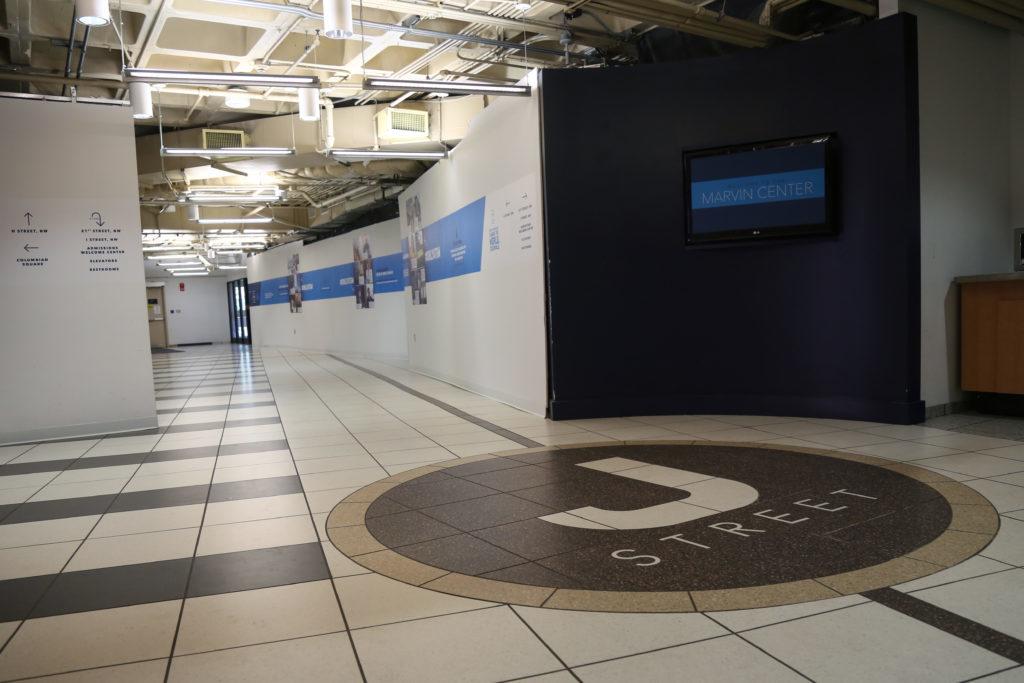When the class of 2021 graduates, GW will be 200 years old. In almost two centuries the University has changed in many ways, and there is more to come.
Campus news from the past year has raised questions about what the future at GW will look like. Here are some of the changes to watch out for in the next year.
Continuing construction
Construction on Rice Hall and 2100 Pennsylvania Ave. that would combine the two buildings and create a shared alleyway is ongoing this summer. Boston Properties, the developer of the apartments at The Avenue above Whole Foods, announced the project will be completed in 2023. A 2023 end date means incoming freshman will see the work continue throughout their time in Foggy Bottom but will likely miss the final product.
In May, it was reported that WilmerHale law firm, which represents some of the Trump family, may lease 300,000 square feet of the space after construction is complete. The companies using the remaining space are expected to be announced later this summer.
After the announcement of the new dining plan for the 2016-17 academic year, officials planned renovations to the Marvin Center space that formerly housed J Street, the food vendor that was GW’s closest option to a traditional cafeteria. This spring, the University announced the former J Street cafeteria will be replaced with a Panera Bread, but the University has yet to release specific dates for construction. The Marvin Center’s student space will also feature a “living room” for students, which Student Association presidents have advocated for since 2015. Incoming freshmen may see this come to fruition in their term here.
The West End Citizens Association and St. Mary’s church added to the construction frenzy when they filed a lawsuit last September against GW Hillel for continuing plans to renovate their building on H and 23rd streets. The church and WECA said that the renovation will damage the adjacent building which they say is historically significant, but Hillel argues that they will take preemptive measures to prevent such damage. The first trial date will be June 14, which will bring the opposing groups closer to a decision in the three-year-long dispute. If the lawsuit is settled, the Class of 2021 may see the barren corner revamped into a new space for Hillel.
Fighting for change
Some resident advisers spent the fall semester organizing to become the first unionized group of RAs at a private university, but they didn’t get the chance to put it to a vote. The National Labor Relations Board gave the group of RAs involved the ability to become the first unionized group of students at a private university this spring after they filed a petition in the fall.
Despite the unprecedented ruling, the vote for the resident advisers to unionize was cancelled when the local labor union that brought the case to the national organization withdrew their petition in May. Because of the postponed vote, the group of students must start the unionization process from the beginning and are eligible to file as early as November. Students can tune in to see if RAs continue to fight for a union.
Student activism on campus continued when then-senior Aniqa Raihan introduced a petition this spring to expel a student who was found guilty of sexual violence against her. The petition got more than 2000 signatures. Students Against Sexual Assault led a rally to protest the handling of Raihan’s case in April and the Student Association unanimously passed a resolution supporting Raihan and sexual assault survivors at GW. The SA bill doesn’t put any policies into action, but students can watch to see if the SA continues to support SASA and sexual assault survivors through advocacy.
The Title IX office, which monitors compliance with gender discrimination prevention laws, is currently in the hiring process for three positions to support the remaining one staff member after a string of turnover in the office. The three available positions include the assistant director for sexual assault prevention and response, after Carrie Ross departed the position in January.
Presidential priorities
Last June, University President Steven Knapp announced that he was stepping down after a decade with the University. Following the announcement, the presidential search committee held a nationwide search last fall and selected Thomas LeBlanc to be the next president of GW.
In Knapp’s first year as president about a decade ago, he made decisions like creating a sustainability task force that would go onto become the Office of Sustainability in 2009.
Incoming University President Thomas LeBlanc has said he wants to come to GW with an open mind before setting priorities and plans to talk with students and the GW community. So the Class of 2021 can keep an eye on invites to speak with the new president and what his priorities will be.
In recent years, the University has invested more in research and STEM programs, with the addition of the Science and Engineering Hall, a focus which some faculty say LeBlanc’s STEM background could support.





